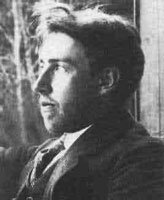Harald Bohr
| Harald Bohr | |
|---|---|

Harald Bohr
|
|
| Born |
Harald August Bohr 22 April 1887 Copenhagen |
| Died | 22 January 1951 (aged 63) Gentofte |
| Nationality | Danish |
| Alma mater | University of Copenhagen |
| Occupation | Mathematician |
| Parent(s) | Christian and Ellen Bohr |
| Relatives | Niels Bohr (brother) |
| Olympic medal record | ||
|---|---|---|
| Representing |
||
| Men's football | ||
| 1908 London | Team Competition | |
Harald August Bohr (22 April 1887 – 22 January 1951) was a Danish mathematician and football player. After receiving his doctorate in 1910, Bohr became an eminent mathematician, founding the field of almost periodic functions. His brother was the Nobel Prize-winning physicist Niels Bohr. He was a member of the Danish national football team for the 1908 Summer Olympics, where he won a silver medal.
Bohr was born in 1887 to Christian Bohr, a professor of physiology, from a Lutheran background, and Ellen Adler Bohr, a woman from a wealthy Jewish family of local renown. Harald had a close relationship with his elder brother, which The Times likened to that between Captain Cuttle and Captain Bunsby in Charles Dickens' Dombey and Son.
Like his father and brother before him, in 1904 Bohr enrolled at the University of Copenhagen, where he studied mathematics, obtaining his masters in 1909 and his doctorate a year later. Among his tutors were Hieronymus Georg Zeuthen and Thorvald N. Thiele. Bohr worked in mathematical analysis; much of his early work was devoted to Dirichlet series including his doctorate, which was entitled Bidrag til de Dirichletske Rækkers Theori (Contributions to the Theory of Dirichlet Series). A collaboration with Göttingen-based Edmund Landau resulted in the Bohr–Landau theorem, regarding the distribution of zeroes in zeta functions.
...
Wikipedia
